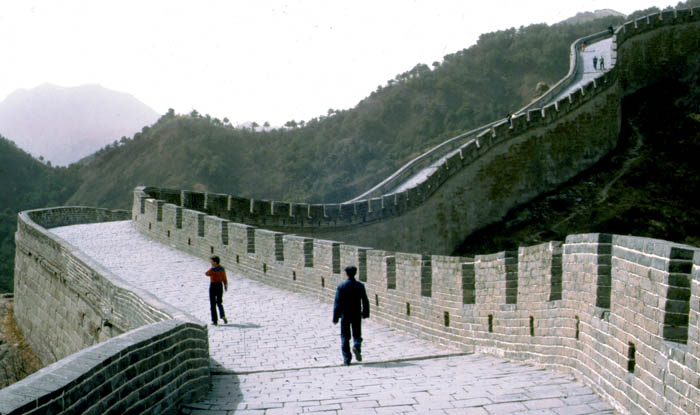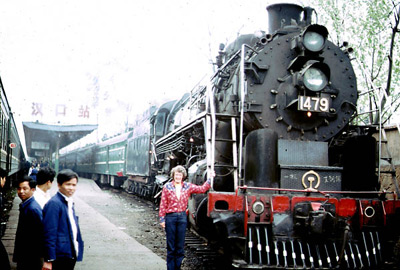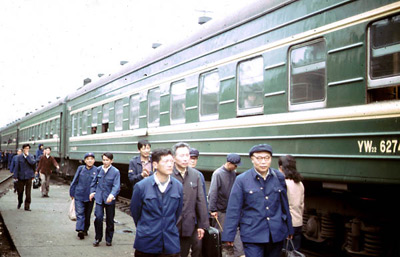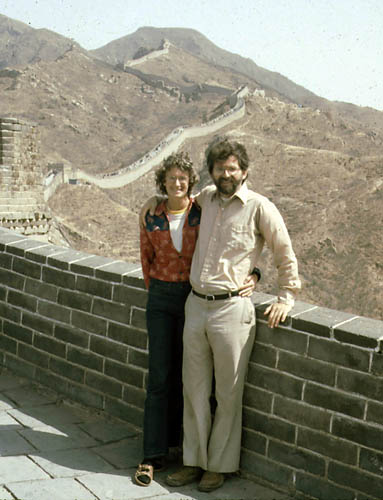|

Diana Hottell on the Great Wall of China. What was
the most foreign place I’ve ever visited? One of them was the “hutongs,” the back-street
neighborhoods of Beijing.
In Hong Kong Diana and I were crammed
into a tiny, closet-size room in a hotel on the fourteenth
floor of a high-rise. That is, the entire hotel occupied
only a part of the fourteenth floor. One room had been sub-divided
into nine tiny cubicles separated only by flimsy, head-high
partition screens. Presto! The one room had now become a
nine room hotel, the Lee Garden Guest House! In this sardine
can of a hotel, in 1983, another traveler told us the astonishing
news that Communist China had just opened up a number of
cities to foreign tour groups for the first time.
 It
took three train rides to get from Hong Kong to Beijing,
the last one lasting 48 hours.

We then
managed the nearly impossible task of obtaining visas for
solo travelers (with no tour group) for China, caught a
train up to Hong Kong’s Northern Territory, walked across
the chaotic, crowded border, caught another train for Guangzhou
(formerly Canton), and spent the next forty-eight hours
on a passenger train to Beijing. The endless rail journey
crossed both of China’s great rivers, the Yangtze and the
Huang Ho (Yellow River), and passed hundreds of miles of
bright yellow fields of rape seed. Early in the morning
the passengers were abruptly awakened by Mao’s revolutionary
martial music. It blasted through scratchy loudspeakers,
shattered the night-time silence, and shattered the nerves
of all passengers. The “music” continued all day.
The most
interesting person I met on the train was a 33 year-old
man dressed in a Chinese army uniform with a red star on
the cap. Xiu Xiao Dung spoke halting English, but was able
to describe his teen-age years when he served as a member
of Mao’s Red Guard and helped to smash and destroy ancient
artworks as well as other reminders of China’s pre-Communist
past. Xiu and the Red Guard were also assigned to monitor
and police any un-Communist behavior wherever he might find
it. He was given the authority to search out teachers, merchants,
laborers, anybody who might be guilty of wrong-thinking,
guilty of ideological error. But now Xiu was an engineer
with the army and he felt extremely lucky to be able to
travel to a trade fair in Guangzhou. His first such trip.
When Xiu learned what Diana and I were doing, traveling
alone for thirteen months, he jerked in shock and quickly
leaned over to tell his colleague who also blanched in disbelief.
Given the salaries in China, there was no one in the country,
including top politburo members, who had the money or the
freedom of travel to do what we two were now doing. I felt
indescribably grateful at that moment. I felt like one of
the elect. I have been blessed by fate. Our year-long trip
was a total impossibility to all the one billion people
in Communist China.
The lengthy train ride ended with the
customary early-morning blast of revolutionary martial music
and we rolled into Beijing.
The train arrived in China’s
great capital city at 7:00 am, just in time to meet the
swarm of morning rush-hour foot traffic. In the gigantic
Beijing Railway Station I walked into the men’s bathroom
and was surprised to see the Chinese version of a group
toilet. It was a long, white-tiled trench latrine which
men had to straddle in order to defecate. Like the other
men, I dropped my trousers, spread my feet across the trench
and squatted. But then I was startled to see half a dozen
Chinese men stop and stare blatantly at my genitals. Their
faces showed no trace of embarrassment or modesty, just
open curiosity. Or perhaps I was the first westerner they
had seen in fifty years.
 Bill
and Diana managed the nearly impossible task of obtaining
solo traveler visas for China in 1983. The most interesting sight for
me was an ancient Chinese apothecary shop – the neighborhood
drug store – in one of the hutongs of Beijing. This city
of nine million (in 1983) is actually a vast collection
of villages crammed together. The “village” is called a
“hutong,” and is divided off from others by a tall wooden
entrance, an ornamental gateway. Unfortunately, the Chinese
government decided to upgrade sections of Beijing by destroying
some of the hutongs, and later rapidly accelerated the bull-dozing
of ancient neighborhoods in order to “modernize” the city
before the Olympic games of 2008. The government has thus
committed a terrible act of vandalism by destroying much
of the early Chinese architecture, culture and the old way
of life.
In any case, Diana and I were privileged to stay
in one of the ancient hutongs in 1983. I walked into a venerable
old apothecary shop, sat down and started looking over the
thousands of large glass jars that lined the walls up to
the high ceiling. I wish I had written down some of the
contents, but there were jars filled with herbs, leaves,
stems, flower blossoms, bark, plants of all types, medicinal
plants with healing characteristics; large jars with deer
horns, jars with large bones, jars with small bones, jars
with bird wings, jars with bird nests, jars with bird beaks,
jars with bird feet, jars with snake skin, jars with dried
reptile parts, jars with dried lizards, jars with dried
sea horses.
A customer would walk in and discuss his ailment
with the druggist who stood behind the two hundred year
old counter. Then the druggist would gather specimens from
several different jars, pick up his butcher knife, chop
them rapidly into a powdery form and pour it into a container
for the contented patient to carry away.
I felt that I had
just gone back in time to another century, to an old China
and an ancient way of life that was very, very foreign to
me.
Here in the Far East, here in a mysterious old apothecary
shop in Beijing I took time to thank my boyhood hero, Tom
Sawyer, for having pointed me toward a lifetime of seeking
adventure.
Spring 1983
|
|

